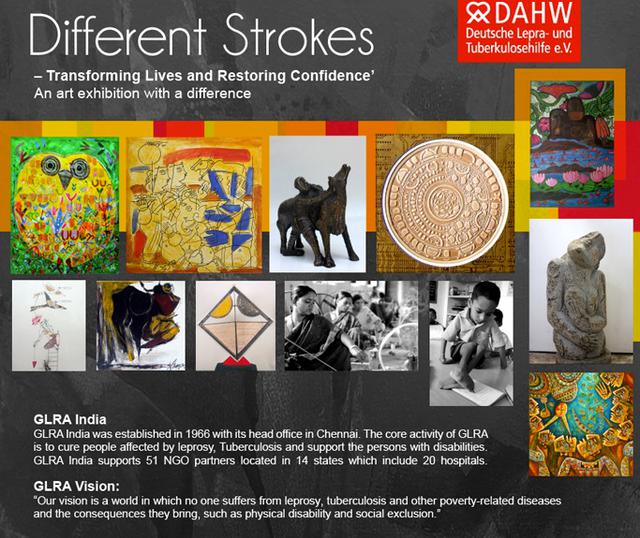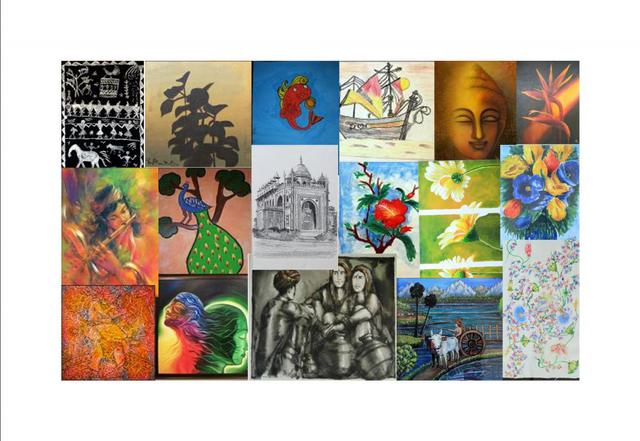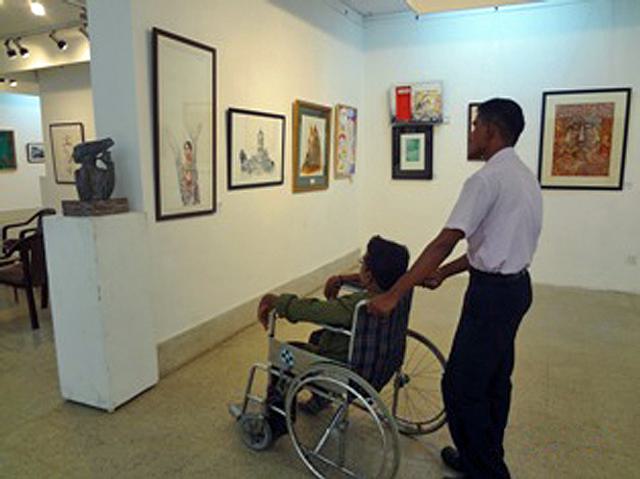The German Leprosy Relief Association: ‘Different Strokes’, the art show with a difference
- Exhibited by
- SOFII
- Added
- August 13, 2012
- Medium of Communication
- Event
- Target Audience
- Individuals
- Type of Charity
- Healthcare
- Country of Origin
- India
- Date of first appearance
- July, 2012
SOFII’s view
Another excellent idea from India, which gave disabled people and children the chance to display their creative work alongside professional artists. It was a great opportunity to show that they are just as talented as the professionals and, through the sale of their artwork, to contribute to raising money that will help other disabled people. What a thrill it must have been to the children, particularly, to see their work hanging alongside that of the ‘grown-up professionals’.
Creator / originator
Anita Rafi.
Summary / objectives
To bring professional and special artists together to create opportunities for disabled artists and to raise money for disabled people.
Background
The German Leprosy Relief Association (GLRA) was founded in 1957 and GLRA India was started in 1966 with a central office in Chenai. Our vision is a world in which no one suffers from leprosy, tuberculosis and poverty-related diseases and the consequences they bring, such as physical disability and social exclusion.
From 23 to 29 July 2012 we staged an art show with a special goal in mind that overrides the motive of art shows usually held in galleries. We called it Different Strokes – the art show with a difference – it was a display of paintings from normal artists, special artists (with disabilities) and children with cerebral palsy. The show was inaugurated on 23 July 2012 by Mr Manohar Devadoss, an artist and writer, Ms Kannagi Packianathan IAS, Secretary, Department of Welfare of the Differently-abled and the German Consul General in Chennai, Dr Stefan Weckbach, was the guest of honour. We were able to showcase the exhibits of over 115 professional and upcoming artists and over 50 disabled artists, which included children with cerebral palsy and learning disabilities.
For 46 years, GLRA India has been working with people affected by leprosy, TB, TB-HIV and presently with people living with disabilities. As a fundraising initiative for people living with disabilities, we have joined with other organisations working with disability such as the Spastic Society of Tamilnadu, MITHRA, the C P Ramaswami Aiyar Foundation and many corporate bodies without whose support this show may not have been possible. On this platform, special artists derived inspiration from professionals and were able to gain confidence from seeing their art work discussed and some of them sold too. For the special children it was a treat to watch their paintings hanging on the gallery walls and people walking away after buying them. This has given them a sense of pride and achievement. The visitor’s book was filled with compliments and positive notes on the show. The most endearing of them read ‘excellent diversity’, ‘awesome stuff’, ‘thought-provoking work’, ‘each one unique – congrats GLRA India’.
Special characteristics
A merging of professionalism mingled with art by special children that has been mutually satisfying and enriching.
Influence / impact
Many disabled artists could exhibit their work, as well as sell them to raise money for other disabled people.
Costs
The cost of paintings ranged from 1,000 to 400,000 indian rupees.
Merits
The event raised money to benefit disabled people and also showed that disabled people can be creative and contribute to their community.
Other relevant information
The event was inaugurated by important people one of them being the Consul General of the Federal Republic of Germany in Chennai.
Follow-up on the project
We produced an online catalogue to benefit our disabled artists and to reach out to those who did not get an opportunity to visit the art show.
Final notes
Our slogans and advertisements read ‘Building Bridges and Transcending Differences’ and we have in reality achieved this. A world of opportunity has been created for disabled people.
 View original image
View original image
 View original image
View original image
 View original image
View original image
 View original image
View original image

















